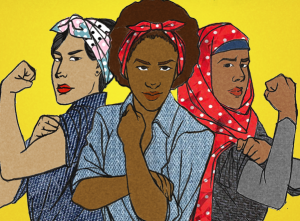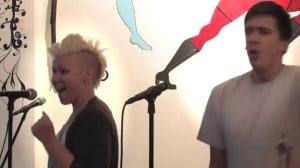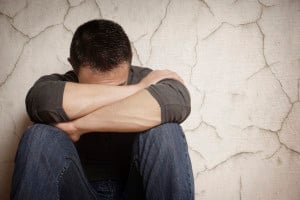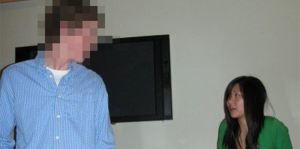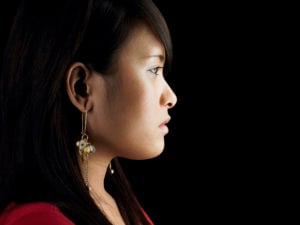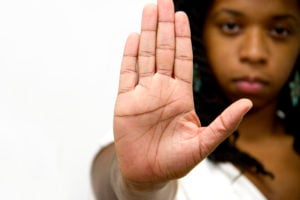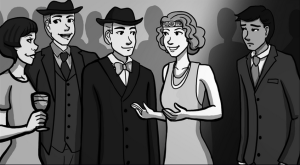We live in a society that draws strict lines about what’s appropriate and what’s not.
It tells us what we “can” and “cannot” wear and who we “should” and “should not” talk to. Everything from the colors we’re supposed to like, to the jobs we should have are lined up for us by society’s narrow definitions of individual personhood.
And while these strict lines are devastating and have extremely real and violent consequences, what usually doesn’t get talked about in these conversations is what society tells us is “impossible.”
But this destabilizing of personal reality is a part of my everyday life.
Everywhere I turn, it seems, there is another person, meme, movie, or article, telling me that not only is my reality untrue, but that I’m “crazy” for believing it to be so (or that, simply, because I’m “crazy,” my reality is automatically untrue).
This experience of having my reality doubted is not new for me. In fact, it’s a type of emotional abuse I’ve dealt with on a personal level for my entire life.
This type of abuse is called gaslighting. And this tactic uses lying and erasure to make the person it’s used against feel as if they don’t have a firm gasp of reality, thus keeping the abuser in power.
But this tool of abuse is also often used by our society at large to plant seeds of doubt in the minds of people who pose a threat to its supremacy.
When you look close enough, it seems that the society we live in resembles less of a loving guardian and more like an abusive partner.
In fact, perhaps unsurprisingly, the first draft of this article was cold, distant, and highly logically formatted, because I’m so used to people dismissing my personal identities and political ideologies as “ridiculous” and “crazy.”
Because of that, I developed a very logical and clinical way of speaking about these things so that I could be taken more seriously by those who would love to erase my experiences and beliefs because I am “overly emotional.”
That’s how embedded it is.
Our society often uses hegemonic understandings of politics and culture to erase practices, identities, and ideologies that pose a threat to white, heteropatriarchal, capitalist supremacy.
And you probably don’t even realize it.
So here are five ways that society and it’s mainstream culture might be gaslighting you – and why they’re totally wrong.
1. ‘You Do Not Exist’
There are many people in this world whose identities, practices, and ideologies don’t fit inside dominant society’s narrow definitions of what is and isn’t possible.
As a witch and a non-binary person, I’m used to being told that what I am simply doesn’t exist – that my lived experiences, my identities, my very notion of reality is impossible.
My reality is destabilized by a society that tells me over and over again, through everything from TV to doctors’ forms, that gender is “objectively” a two-party system.
It is further destabilized by a culture that tells me – again, from TV to scientific literature – that my religious practices are “deluded.”
In fact, I first began to explore the idea of culture gaslighting in a class on the politics of the witch-hunt. In class, we spoke about how “the witch” and their practices were persecuted because they posed a serious threat to the rise of early capitalism. Now, they’re now mocked and discredited to keep them powerless.
This extends to all whose practices and/or identities don’t benefit (or explicitly threaten) the status quo. It extends to folk healing, most non-Christian religious beliefs, dream work, midwifery, and even non-nuclear family structures.
Cultural gaslighting keeps down communities and individuals by creating a dominant cultural narrative that, not only excludes certain identities and practices, but leaves absolutely no room for the possibility of them even existing.
This leaves those who dare to believe the “impossible” in a constant state of doubt or a constant state of being disbelieved.
But you do exist – and your practices and realities are valuable and true. In fact, continuing to exist within these “impossible” spaces and staying true to your “impossible” beliefs is it’s own type radical and revolutionary act.
2. ‘You Are a Failure for Needing Family or Community’
Recently, I decided to spend the summer living at my mom’s house so that I can save up money without having to pay rent. This living situation allows me to save money I would other wise have to spend on rent and utilities, and it gives me access to my familial support system (aka Mom Support™).
But, despite this being a really wise choice for me and my own personal situation, I’ve nonetheless been gripped with anxiety, thinking that others will view me as a failure for having to spend time living at my mom’s house – even though it’ll be a stable, healthy living environment for me.
And that’s because our current society teaches us that the only way in which you can mark your success is by isolating yourself from your family or community.
In Western understandings of success, living with mom and dad simply doesn’t cut it. An adult living with their parents is deemed a failure, both socially and financially.
Not only is this understanding mostly Western and overwhelmingly colonial in practice, but it also tells people who find strength in their communities and families that they’re “less-than” and “unsuccessful.”
This effectively tricks us into thinking that we’re most powerful without our families and communities – when, in fact, family and community are a large source of power, especially when aimed against an exploitative ruling class.
Capitalism took hold when the common lands were enclosed. Our connection to our family and our larger community is so powerful that the first step to “modernize” systemic violence was to cut that cord and teach us that going back was a sign of failure.
This tells us something that so many already know: There is political and social strength in family and community. To take back the importance of community and family strength is to create a social world in which you do not have to feel vulnerable to the intimidations of a society hell bent on tearing you down one by one.
Community allows us to come together in a way that makes relying on an oppressive system unnecessary, effectively taking power away from the state and putting it back into the people.
3. ‘You Haven’t Created Anything’
Another way that this type of systemic abuse operates is by stealing cultural expression – and then erasing the sources of its creation.
This is something that has been brought into the spotlight recently and is better known as cultural appropriation.
This type of oppression leaves communities disempowered, as the beautiful things they’ve created in resistance to violence are stolen and misused by the very groups that oppress them.
Cultural appropriation continually tells marginalized people that the creative ways they have resisted (and continue to resist) oppression are not theirs and do not exist as their own.
As another Everyday Feminism writer, and all around awesome human, Maisha Z. Johnson, says in her article “What’s Wrong with Cultural Appropriation”(linked above), cultural appropriation trivializes, and sometimes outright denies, historical trauma.
By erasing marginalized groups’ artistic forms of resistance and stripping them of their cultural and historical significance, folks are told over and over again that their pain doesn’t matter – or that it doesn’t exist at all.
But it does.
And so many beautiful things have come into this world as a sign that people, communities, and cultures are still living and resisting, even in the face of so much violence and oppression.
4. ‘If You Really Cared, You Would Reform’
Many radicals have often come across folks who continually tell us that what we’re doing could never work – that direct action, community building, and alternative economic political states are a pipedream.
We’re called “delusional” or “crazy” (language so wrapped up in abuse and ableism) if we think there can ever be an alternative to capitalism – and that we’re actually making things worse by not participating in the system (like not voting).
For example, as a non-binary trans person and a young queer person, I feel that “gay” marriage politics fall far from what could be called LGBTQIA+ liberation.
“Gay” marriage doesn’t address the fact that our very society is built upon queerphobic and transphobic ideologies, and “’gay” marriage rhetoric actually asks LGBTQIA+ people to assimilate into the very culture that roots itself in LGBTQIA+ oppression.
But when I voiced this opinion, I constantly had people telling me to just shut up and “be happy.” Liberals and conservatives alike continued to tell me that my identities and political ideologies were “crazy” and that any “sane” political goal would be assimilation into the system – even though that system actively oppresses me and my community, marriage or no marriage.
This kind of gaslighting – wherein society dismisses the possibility of radical political change – leads to many folks turning towards reformism, liberalism, and “the lesser of two evils” politics.
But this denies the reality of those who are further oppressed by both evils, regardless of how “lesser” one may be.
It demands that people continually oppressed by our political system are simply not “trying” hard enough to find a way to liberate themselves within socially acceptable guidelines.
This type of thinking denies the reality that it’s our political system itself that oppresses, dehumanizes, and exploits – and then tells the victims of this system that their understanding of their own oppression is invalid.
More importantly, it tells people that to dream of a system free of this type of systemic oppression is “crazy.”
But to dream of something better for yourself and your community is the bravest thing you can do. To continue to imagine a world beyond our current system, in the face of all those who tell you it’s “impossible” is revolutionary, radical, and beautiful.
It’s our abusive and oppressive society that tries its best to steal our imagination from us so that we can’t dream of something better. So, it’s an act of rebellion to dream a new reality into being.
5. ‘Radical Organizing Has Never Worked’
A big part of gaslighting, in any of its horrible forms, is a rewriting of the past.
Victims of this type of abuse are constantly being fed lies about what went on in the past – lies designed to paint a picture of the past that favors the position of the abuser.
Political and cultural gaslighting is no different.
Take, for example, how “gay” rights “activism” moves forward without ever recognizing the fact that queer liberation started with trans women and gender non-conforming street folks. How so many people tell a story of Stonewall that centers cis, white, gay men. This is a lie. It’s a false history.
This type of gaslighting manifests by cutting people off from the truth of their past and sometimes actively works to hide the power of radical organizing from the ancestors of these movements.
This shows up in a myriad of different ways, from the assimilationist retelling of queer resistance to the demonization of The Black Panther Party.
This erasure of history disempowers communities and individuals by lying to them. And it creates a false understanding of the past that’s orchestrated specifically to manipulate people into thinking that radical organizing is ineffective and that it has never successfully existed.
This leaves communities of people feeling as if they have no power to change the world they live in, corralling people into assimilation politics, giving more and more power to the very system and types of politics that have roots in their oppression.
This denies the very real history of successful grassroots organizing, and this denial is done specifically to stop people from putting their time and effort into political alternatives.
On top of denying the past, this actively tells people who are currently doing this type of organizing that the work they do isn’t real.
But in reality, it makes all the difference.
I can testify personally to this difference as an organizer and as someone who has benefited from community organizing. Safer spaces, community gardens, sit-ins, community-run shelters, and more, do (and have done) more for the people in those communities than the slow and ineffective game of reform can ever do.
***
While gaslighting is most commonly used to describe an insidious form of emotional and mental abuse, I believe that our current society often operates under the same logic as an abuser.
It’s a system that dehumanizes, oppresses, and exploits, and then uses everything in its power to make us forget our own personal power and the power of united communities – all in order to strip away the power we have to create a better world.
But don’t be fooled.
You exist, you are powerful, and this political nightmare can be fought only if we remember we have the collective power to wake up.
[do_widget id=’text-101′]
Kris Nelson is a writer who runs a blog full of short queer-centric radical prose and a YouTube channel called The Whispering Witch, focused on uplifting guided meditations and relaxation videos. Kris also runs an online store by the name of SpellBoundTreasures, where they strive to bring magic into the world through crystal jewelry and herbal remedies. They can be contacted on Tumblr or at [email protected].
Search our 3000+ articles!
Read our articles about:
Our online racial justice training
Used by hundreds of universities, non-profits, and businesses.
Click to learn more






